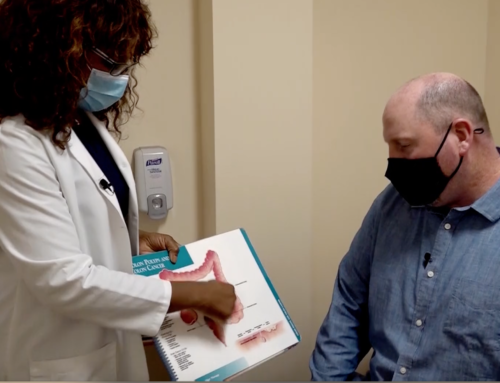 We all have important men in our lives: dads, grandpas, sons, brothers, partners, uncles, friends. The most important thing about these men? Their health and well-being, because we want them around for a long and healthy life. This is why there is a whole week focused on the health of all the important men in our lives.
We all have important men in our lives: dads, grandpas, sons, brothers, partners, uncles, friends. The most important thing about these men? Their health and well-being, because we want them around for a long and healthy life. This is why there is a whole week focused on the health of all the important men in our lives.
National Men’s Health Week is observed each year leading up to Father’s Day. In 2018, it is celebrated June 9 through June 15. This week is used to raise awareness of preventable health problems, and to encourage early detection and treatment of disease among men.
Most of the leading causes of death among men are preventable, so this month Dr. Lynn O’Connor, a leading Colon & Rectal Cancer Surgeon, is leading the charge to raise education and awareness. Through education and being proactive, men can keep their health in check and help prevent some of the deadly diseases brought on by genetics and unhealthy lifestyles.
According to the Men’s Health Network, a lack of awareness, weak health education, and unhealthy work and personal lifestyles have caused a steady deterioration of the well-being of American men. In fact, a report from the National Center for Health Statistics found that more than one in five guys have not seen any kind of health professional in over a year.
Colon Health
Colon cancer is one of the most common cancers among American men. Of course, it is important to catch all cancers early, but colon cancer can be prevented if men are regularly screened and live healthy lifestyles. Colon cancer usually develops slowly, beginning first as a small growth (polyp.) Polyps may grow larger over time and eventually turn into cancer, which can take several years. This is why staying on top of screenings and health can be the best guard against this deadly disease.
Be proactive: The number one way to prevent colon cancer is to get screened. Men should begin getting screened at the age of 45, or even earlier if there is a family history.
Heart Health
Cardiovascular disease, also called heart disease, refers to heart conditions that include diseased vessels, structural problems, and blood clots. According to The American Heart Association, men account for nearly 50 percent of deaths caused by heart disease: more than one in three adult men have some form of it.
Heart disease is the leading cause of death in men. It comes in many forms, all of which can lead to serious, fatal complications if they go undetected and aren’t treated early. Some of the most common forms are:
- Coronary artery disease
- High blood pressure
- Stroke
- Cardiac Arrest
- Congenital heart disease
Be proactive: Keep that heart healthy and beating by staying on top of routine checkups. Doctors can calculate men’s risk for heart disease based on several factors: cholesterol, blood pressure and even lifestyle habits, like smoking and diet.
Diabetes
Nearly 15.5 million men in the U.S. over the age of 18 have diabetes. If left undiagnosed and untreated, diabetes can lead to many other health problems: nerve and kidney damage, heart disease and stroke, and even vision problems or blindness.
Be proactive: The best way to control diabetes is to eat healthy and exercise. Men should know their family history of diabetes and visit their doctor to have periodic screenings.
Respiratory Diseases
Data from the U.S. Centers for Disease Control and Prevention (CDC) shows that nearly 70,000 men die each year from chronic lower respiratory disease. This accounts for more than five percent of all deaths among men, making it the fourth leading cause of death.
Chronic lower respiratory disease encompasses lung ailments and diseases, such as emphysema, chronic obstructive pulmonary disease (COPD), and chronic bronchitis.
Another culprit? Lung disease, or lung cancer. The CDC reports that the number of lung cancer cases in men increases each year. While exposure to occupational hazards like asbestos increases risk, smoking remains the leading cause of lung cancer.
Be proactive: First-off, all smokers should quit immediately. Avoiding exposure to tobacco smoke, home, and workplace air pollutants, and respiratory infections can help prevent the development of COPD and lung disease. Men should visit their doctor regularly and get screenings.
Cancers
Although lung cancer is the leading cause of cancer-related deaths, it’s not the only cancer men are at risk for. According to the CDC, the five most common cancers among American men are:
- Lung
- Prostate
- Colorectal
- Bladder
- Melanoma
Be proactive: Men should protect themselves by getting regular screenings, and by practicing safe and healthy behaviors: avoiding tobacco and smoke, wearing sunscreen, eating a healthy diet and regularly exercising.
Remember, National Men’s Health Week is about educating, raising awareness and encouraging healthy lifestyles for males of all ages. All men should live a healthy lifestyle, because that is the easiest way to prevent these diseases and ailments: they should eat a healthy diet, exercise regularly, quit and avoid smoking, and stay away from alcohol. Most importantly, they should visit their doctors regularly.
Family and friends should encourage the men in their lives to see a doctor or health professional for regular checkups and to learn about their family health history. Men can prepare for doctor’s visits and learn which preventive tests or screenings they need. Certain diseases and conditions may not have symptoms, so checkups help identify issues early or before they can become a problem.
Dr. Lynn M. O’Connor dedicates her practice to providing the foremost treatment, technology, and information related to preventive public health issues and colon and rectal health. An outstanding surgeon and health advocate, Dr. O’Connor is also the Director of the Women’s Colorectal Care Program for ProHEALTH Care Associates in the Greater New York City area. Click HERE to contact Dr. O’Connor’s office, or to schedule an appointment.
This blog provides general information and discussion about health, medicine, and related subjects. The content provided in this blog, and in any linked materials, are not intended and should not be construed as medical advice. If you have a medical concern, you should consult with a licensed physician or appropriate health care worker. If you think you may have a medical emergency, call your doctor immediately. The views expressed on this blog and website have no relation to those of any health care practice, hospital, or other institution with which the author is affiliated.




